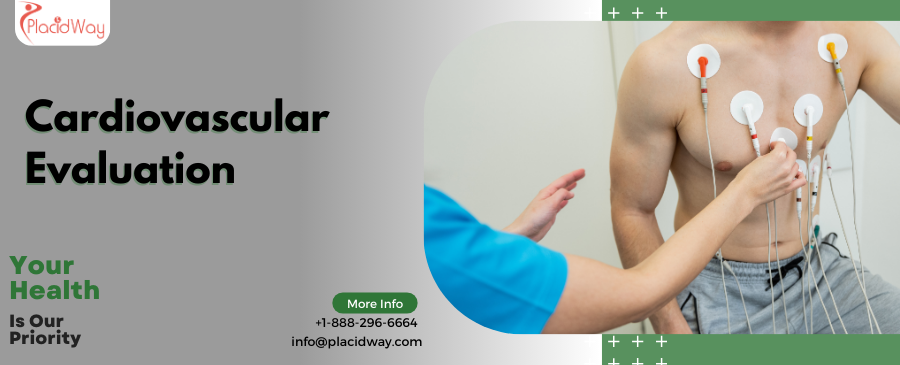
Table of Content
Key Insights at a Glance
- Cardiovascular evaluation is essential for diagnosing heart conditions and assessing overall cardiovascular health.
- The evaluation includes multiple tests such as ECG, stress tests, and imaging studies.
- Costs for cardiovascular evaluation abroad can be significantly lower than in developed countries.
- Accredited hospitals with experienced cardiologists ensure high-quality care for patients.
- Patients can typically complete evaluations within 1-3 days depending on the tests required.
What is Cardiovascular Evaluation?
Cardiovascular evaluation is a comprehensive assessment of the heart and blood vessels to determine the health of the cardiovascular system. It typically includes various diagnostic tests, such as electrocardiograms (ECG), stress tests, echocardiography, and blood tests, aimed at detecting any potential issues such as heart disease, blocked arteries, or irregular heart rhythms. It is especially recommended for individuals with risk factors like high blood pressure, diabetes, smoking, or a family history of heart disease.
Symptoms Indicating the Need for Cardiovascular Evaluation
- Chest pain or discomfort
- Shortness of breath
- Irregular heartbeats or palpitations
- Fatigue or weakness
- Swelling in the legs or feet
Latest Techniques for Cardiovascular Evaluation Available Worldwide
| Technique | Description |
|---|---|
| Electrocardiogram (ECG) | A non-invasive test that records the electrical activity of the heart to detect irregularities. |
| Stress Test | Evaluates heart function under stress, typically using exercise or medication to simulate exertion. |
| Echocardiography | Uses ultrasound to produce images of the heart, helping assess its structure and function. |
To find out Different Packages for Cardiovascular Evaluation, Click here.
Safety Concerns Related to Cardiovascular Evaluation Abroad
- Potential complications from stress testing, especially for patients with severe heart conditions.
- Possibility of false positives or negatives in test results, requiring further evaluation.
- Infection risk with invasive procedures like catheter-based tests (if applicable).
Benefits of Cardiovascular Evaluation Abroad
- Access to advanced diagnostic equipment at a lower cost.
- Shorter wait times compared to public healthcare systems in some countries.
- Comprehensive evaluation packages that include multiple tests and specialist consultations.
Risks Associated with Cardiovascular Evaluation Globally
- Risk of overdiagnosis leading to unnecessary procedures or interventions.
- Possible allergic reaction to contrast dyes used in imaging tests.
- Complications from invasive testing methods, such as bleeding or infection.
Procedure for Cardiovascular Evaluation
The cardiovascular evaluation process typically includes the following steps:
| Step | Description |
|---|---|
| 1 | Initial consultation with a cardiologist to review medical history and symptoms. |
| 2 | Performing diagnostic tests like ECG, stress test, and echocardiography. |
| 3 | Reviewing test results to identify any cardiovascular issues. |
| 4 | Discussing findings with the patient and recommending further action if needed. |
Cost of Cardiovascular Evaluation in the World | Compare Prices
| Country | Estimated Cost (USD) |
|---|---|
| Mexico | $1,000 - $1,500 |
| Turkey | $1,200 - $1,800 |
| Thailand | $1,500 - $2,000 |
| Colombia | $900 - $1,400 |
| India | $800 - $1,200 |
| Austria | $2,500 - $3,500 |
| USA | $3,000 - $5,000 |
| UK | $2,800 - $4,000 |
Find Prices for Cardiovascular Evaluation Near You: Click here.
FAQs Related to Cardiovascular Evaluation Overseas
What does the Cardiovascular Evaluation cost without insurance?
The cost of cardiovascular evaluation without insurance can range from $800 to $5,000 depending on the country and the complexity of the tests required. Countries like India and Colombia offer more affordable options compared to the U.S. or the U.K.
How long does a cardiovascular evaluation take?
The evaluation typically takes between 1 to 3 days, depending on the number of tests required and the patient's medical history. Some tests, such as stress tests, may require preparation and follow-up, extending the total evaluation time.
Are there any risks involved in a cardiovascular evaluation?
Most of the diagnostic tests are non-invasive and carry minimal risks. However, stress tests and invasive imaging procedures may have risks, such as allergic reactions to contrast dyes or complications from catheter-based testing.
What should I expect during my first cardiology consultation?
During the first consultation, the cardiologist will review your medical history, discuss your symptoms, and recommend diagnostic tests based on your risk factors. You may undergo basic tests like ECG during the initial visit.
Is cardiovascular evaluation recommended for asymptomatic individuals?
Yes, cardiovascular evaluations are recommended for individuals with risk factors for heart disease, such as high blood pressure, diabetes, smoking, or a family history of cardiovascular conditions, even if they are asymptomatic.
Book Your Cardiovascular Evaluation Appointment Today
Ready to take proactive steps for your heart health? PlacidWay can connect you with top-quality hospitals and experienced cardiologists for a comprehensive Cardiovascular Evaluation Abroad. With access to advanced diagnostic tools and affordable pricing, we aim to help you achieve optimal cardiovascular health. Contact us today to learn more and schedule your evaluation. Let PlacidWay assist you on your journey to better heart health!
Executive Treatment Abroad, Physical Exam Abroad










Share this listing